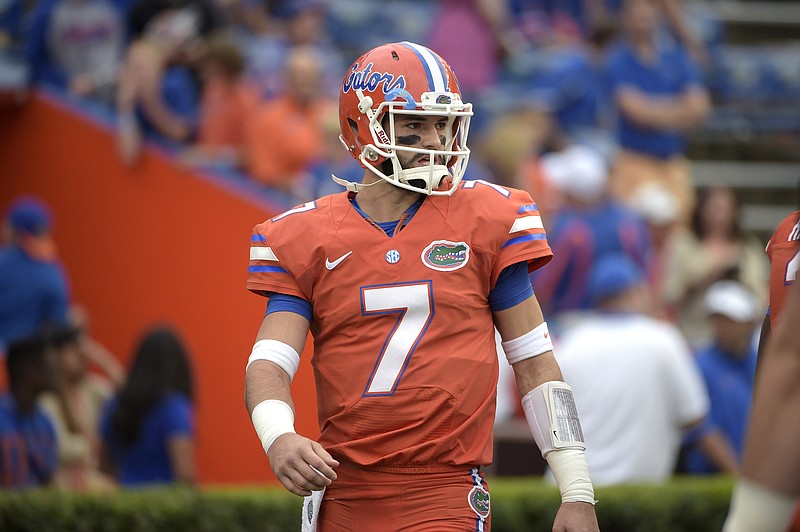Could Florida's agony become ecstasy for much of the rest of the SEC East?
That briefly seemed to be the focus Monday afternoon when it became known that Gators quarterback Will Grier has been suspended for one calendar year by the NCAA for failing a performance-enhancing drug test.
With the undefeated Gators (6-0, 4-0) currently running away with the SEC East race - up at least one game on everyone and already owning tiebreakers against Kentucky (2-1) and Tennessee (2-2) - if there was any slender chance for the rest of the East to challenge for the division crown, Grier's suspension would seem to be it.
Especially with Florida facing remaining road games against LSU (this Saturday) and South Carolina, plus the annual neutral-site game against Georgia in Jacksonville, Fla., as well as dangerous Vanderbilt.
Unfortunately for the Big Orange Nation, those odds still seem quite long realistically, if only because the Volunteers would appear to need to win out, beginning with that Oct. 24 contest at No. 10 Alabama, which hasn't lost to UT since 2006.
Even then, Florida would have to lose three of its final four league contests for the Big Orange to reach the Big Peach for the SEC title game on Dec. 5. Not impossible, but not likely.
What Grier's suspension does do is keep Georgia's hope alive if the Bulldogs can win out after losing their last two league contests to Alabama and Tennessee. Let the Dawgs topple Missouri between the hedges this weekend, upset Florida and later survive a home game against Kentucky and a road contest at Auburn and they will represent the East in the Georgia Dome.
Of course, technically speaking, UK has the best chance to benefit from Grier's absence, since the Wildcats somewhat control their own destiny moving forward. Let Big Blue win out, beginning Thursday night against visiting Auburn, and Kentucky could make its first SEC title-game appearance ever - only UK, Ole Miss, Texas A&M and Vanderbilt have failed to play in the championship game a single time - if Florida loses two league games the rest of the way.
But with the Cats still facing road games at Mississippi State, Georgia and Vanderbilt, as well as home games against Auburn and Tennessee, it would seem highly unlikely they could win their remaining five league games.
So Florida's mission is simple: Beat Georgia and you're pretty much assured of winning the East. And with Treon Harris possessing past experience as a starting quarterback for the Gators, the drop-off from Grier could be less dramatic than many Florida fanatics fear.
But thanks to a tweet first circulated at 9:19 p.m. Saturday, what is far less clear is exactly when Florida knew that Grier had failed the PED test. And if it knew prior to that night's game, why was Grier allowed to play in the Gators' win at Missouri, which obviously has a huge impact on the division standings?
Written by "JokerSloth" on the Gators' 24/7 website, the tweet said: "Enjoy tonight cuz it's our favorite player's last game for a calendar year. Roids."
It defies logic that JokerSloth merely guessed right at that moment. Maybe he or she has a friend inside the NCAA who leaked the info, which means that friend probably should be suspended without pay for a calendar year if Florida coach Jim McElwain is telling the truth that he knew nothing until Sunday.
Beyond that, since both Grier and McElwain said the substance was found in an over-the-counter supplement, wouldn't it be nice if it was divulged what that substance and supplement both were? Especially when McElwain added in Monday's news conference: "Before you even take cough medicine, you've got to check with the medical staff to allow you to be able to."
This isn't to criticize the NCAA for coming down hard on PEDs. The NFL, NBA and Major League Baseball should probably be similarly tough, given all the damage such drugs tend to do your body later in life, plus the unfair physical advantage they appear to give athletes in the early years they take them.
But illegal drugs, alcohol and physical violence also do untold damage and rarely carry such stiff penalties. For proof, merely consider the past history of Florida's Harris, who - according to ESPN - was suspended for the Tennessee game last month supposedly because of a failed drug test.
But that was one game. This is a calendar year for what we're being told is a single failed test. Nor are all PEDs of equal impact. There should at least be an explanation of what the athlete tested positive for and whether it really was acquired over the counter or illegally, if only to serve as a further warning for those who might be unaware of all the places PEDs can be found.
In a society that forgives almost all first offenses, it would seem particularly fair to allow a first-time offender for a PED found in an over-the-counter medication to be handed a four- to six-game suspension, with a year to come for a second offense and a permanent ban from the collegiate game for anyone stupid or arrogant enough to test positive a third time. Heck, you could ban the athlete from professional sports for the third offense if the first two occur in college.
But that really has nothing to do with that Saturday evening tweet. If anyone from Florida knew of the failed PED test before the Missouri game began, the NCAA needs to be clear about why Grier was allowed to play.
And if no one at Florida knew, why did JokerSloth know?
For six other schools in the SEC East, when both the NCAA and Florida knew and what they knew would seem almost as important as figuring out how to beat the Gators without Grier.
Contact Mark Wiedmer at mwiedmer@timesfreepress.com.
